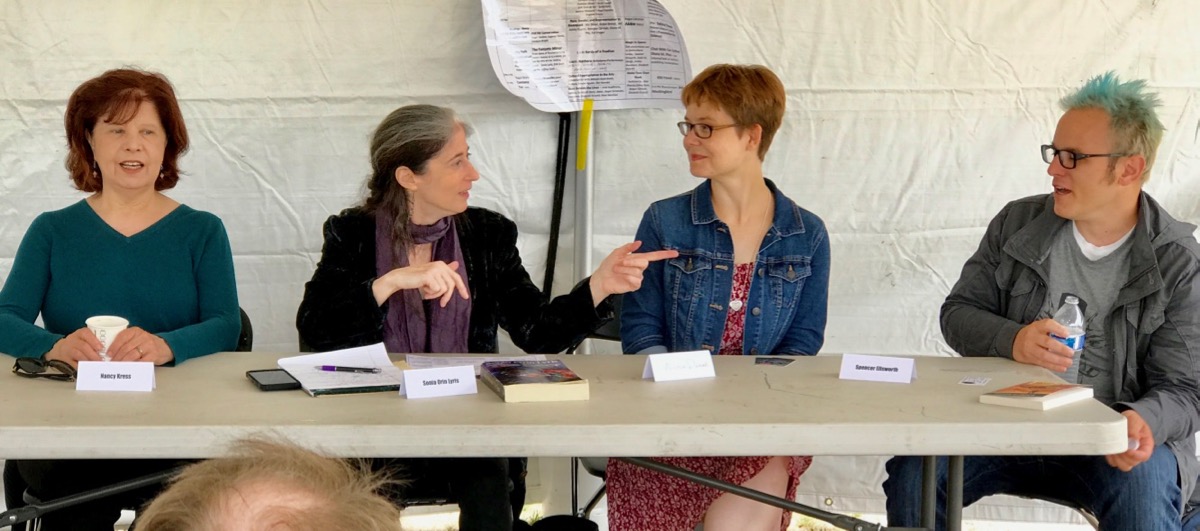Visiting the first Readerfest
Seattle’s first Readerfest — a book festival brought to life in record time by Karen Junker — took place Saturday at Magnuson Park, in The Brig. I’m assuming the building actually used to be a brig. It's a building that comes together at angles, wings converging on a boxy center. The keynote took place in the Matthews Beach room, the "beach" part evoked by colorful murals on the painted cinderblock walls. Tables, with black cloths and flowers, set the stage where keynote speaker (and Seattle Review of Books columnist) Nisi Shawl spoke to the small crowd who made it in time to hear her introductory remarks.
Shawl — and emcee Ashley Lauren Rogers, in her introduction — made an early point of acknowledging that we were gathering on native ground, after which she read her prepared remarks. She talked about Trump, or rather, how he has affected writers. “Trump’s presidency has done us harm,” she said. It has also led to a strong uptick in the amount of anthologies sending her requests for work, most of which are resistance themed.
But creating is hard when the news is a constant deluge of shocking inhumanity. Some call those who are affected by our administration "sensitive", and she had words for them: “Sensitivity is a tool as well as a wound. Sensitivity is vital to the process of writing: I write with all my senses turned up to eleven… I write with my heart.”
There was plenty of heart on display in the gathering of authors, publishers, and booksellers. I browsed the tables, stopping to chat with Balogun Ojetade who was showing his Afrofuturism gamebooks, and RPGs (although he’s also a novelist and screenwriter). His work covers grand themes of fantastical black experiences and look like a lot of fun, to boot. Read the description for Dembo’s Ditty to get a feel.
Broken Eye Books was showing their work, so I stopped by to talk to publisher Scott Gable (SRoB co-founder Paul Constant reviewed their release of Adam Heine’s Izanami’s Choice last year). We chatted for a few minutes over a table chock-full of interesting work, like Desirina Boskovich’s Never Now Always, and their anthology of Lovecraftian sci-fi titled Tomorrow’s Cthulhu. They’re a publisher to keep an eye on.

Outside, in the cloud-covered day, tents were set up for events. I dropped in to hear a panel with Nancy Kress, Sonia Orin Lyris, Nicole Dieker, and Spencer Ellsworth talking under the banner of “What makes a story literary?” The conversation was lively and entertaining, but what made it particularly valuable was the opportunity to attend, in effect, a master class with Kress, one of the most accomplished and engaging science fiction novelists working today. We’re lucky to have her in Seattle now, and seeing her pop up at events like Readerfest shows how much attention they paid to who they invited to speak.
Another thing Readerfest got right was inclusivity and diversity. Nicole Dieker said that for her, “the best part of Readerfest was its emphasis on inclusivity and representation." If you didn't get a chance to see the programming slate, take a look — from the choice of speakers to the panel topics, it's clear that Readerfest is actively working to amplify #OwnVoices and go beyond the usual "here are a bunch of panels about X, and here's one panel called women in X and another one called diversity in X" approach." At Readerfest, inclusivity wasn't pushed into one panel. It was a central part of the convention.
Still, around the edges, the youth of the festival showed. Although the food trucks looked delicious, they didn’t offer a lot of variety, and I know at least one person who wasn’t able to get food that fit their dietary needs. The signage when approaching the venue was too sparse, and confusing. The layout of the space was strange enough that maybe a table out front to welcome people, next time, would be welcome, as would maps — it took a bit of exploring to find everything.
Maybe that’s what you get for pulling together a festival in record time. With a whole year in front of her, I’m certain that Karen Junker, the driving force behind Readerfest, can pull off something on a bigger scale. One person I talked to said the event felt like “rehearsal for the real event,” and that seems about right.
But small certainly has its charms, too. The vibe was a bit like wandering into the back halls of a science fiction convention where some great conversations were taking place out of the limelight, and that was a welcome feeling. There was time, and opportunity, to connect with the people you wanted to.
In her keynote, Shawl recalled Octavia Butler, and how if you look through Butler’s papers at the Huntington Library, you'll see that she was deliberate about her work and intention. She used affirmations to guide herself toward the future she wanted, the future she built. So, following this example, Shawl offered us four affirmations, which we listened to her speak, then all spoke together, as an invocation to close her secular sermon.
- We are beautiful, and we have every right to glory in our beauty.
- We belong where we're going. We're getting there
- We have important stories to tell, and important ways of telling them
- We live in love.
Here’s to the foundations of Readerfest, and to its future, built one reader at a time. All are welcome.